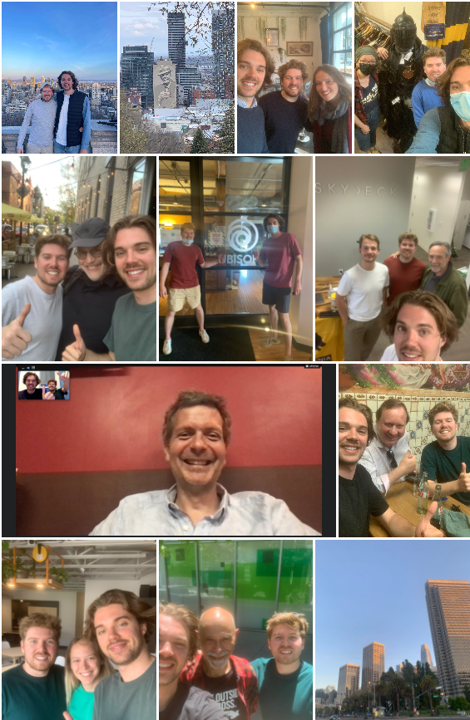
We have been back in France since August 1st. We have just recruited a great duo, Élodie, and Dimitri, whom we will officially introduce to you soon. They should leave in January 2023 and continue the incredible adventure of the Managerial Odyssey.
On our side, we are starting a series of conferences to share our experiences and tell about our discoveries. Are you interested in discussing the topic with us? Do not hesitate to write us (meyer1clement@gmail.com / romain.c.meyer@gmail.com) or contact us on LinkedIn.
We are passionate about what we are doing today and what we have done with Managerial Odyssey; this is only the beginning! We are building our future today and are still interested in meeting people, discussing and inventing the future of work together. We are currently between Lyon and Paris and will be very happy to exchange with you! Do not hesitate 😉
See you soon,
Clément & Romain
From April 27 to June 11, 2022, we discovered Canada and the United States for the fifth and sixth stages of the Managerial Odyssey.
It was an opportunity for us to meet 35 companies and 47 employees! A very intense moment, marked by conferences and media interventions in addition to the professional meetings.
As for Norway, Iceland, Brazil, and Colombia, our understanding of these two cultures is not exhaustive, and the examples we will give you do not reflect the behavior of all companies. We have been to Montreal and San Francisco, two very particular cities that sometimes operate differently than the rest of the country.
Our arrival in Montreal was special. After three months of travel, we are halfway through the adventure and have discovered societal and managerial cultures very different from ours. For the first time, we are in our comfort zone, surrounded by French people living on site. However, we quickly realized that the Montreal management culture is not the same as in France and that we would have to learn a lot.
Our stay in San Francisco was quite atypical. We immersed ourselves in the world of Silicon Valley, whose companies regularly influence management methods worldwide (Google, Salesforce, Netflix, etc.). Encounters are as engaging as they are intriguing, as money is at the heart of all reflections and the transaction at the heart of all exchanges. Our exchanges did not necessarily correspond to our managerial ideals there; nonetheless, an unavoidable destination given its influence on the world.
Our meetings in San Francisco allowed us to reflect on the intention behind the organizational transformation. Consideration for others? Performance? This a fascinating question whose answer seems quite clear in Bay Area companies.
Managers’ posture in Montreal companies is not exactly the same as in France or other countries we discovered before. Two elements marked us in the managerial culture: the recognition of employees and the respect of human beings.
We quickly understood the importance of recognition in companies with Michel Bundock of the Groupement des chefs d’entreprise: “the need to be recognized is more important than the need to be loved.” Recognizing the successes and qualities of one’s teams is a relatively common idea, but one that makes sense for the first time here in Montreal.
The Canadian company OfficeVibe has set itself the mission of responding to the need for employee recognition in the workplace with its GoodVibes tool.
Goodvibes was designed to celebrate the small victories and compliments everyone might miss, especially when remote work is present in the company. Julie, HR Speaker and Researcher at OfficeVibe, explains that at work (and this has been reinforced with the move to remote work), we don’t always have the opportunity to share why we appreciate one another.
Indeed, recognition is one of the ten engagement metrics and one of the lowest scoring among clients. That’s when Julie thought of creating Goodvibes. The principle is simple: send recognition cards and compliments to her colleagues. Fascinating feature: the manager receives a copy for each Goodvibe sent, which allows him to have more visibility on the interactions between the teams.

Example of a recognition card sent on OfficeVibe
Genuine respect for human beings in companies accompanies the recognition of teams in a company.
Chloe from the company “fabric” used a phrase we shared to talk about Canadians’ behavior in the professional world: “they are hard on problems and soft on people.”
Unlike Norway, Canadian managers do not necessarily try to create personal relationships with their employees. On the other hand, they implement several managerial practices to care for employees and respect who they are.
The practice of check-in / check-out:
At the beginning and end of each meeting, employees express their state of mind and feelings. The space given for one’s expression and respect for every individual’s words impressed us. Michel Bundock underlined the “big difference between listening and waiting for someone to finish speaking.”
We attended several check-in and check-out moments, sometimes with intense emotions, like this check-in during a governance meeting (holacratic governance model) with a Montreal company. At the beginning of the meeting, an employee explained that he was tired and that his week was very stressful. During the following interactions, we felt a tension in his verbal expression and sometimes cold reactions. Thanks to the check-in, we could better understand his reactions, listen to him and not hold them against him. A colleague could have gotten angry at him, not understanding his behavior, but this was not the case.
We adopted this practice when recruiting the next duo for the Managerial Odyssey. We were often in a very particular context (in a foreign country, with a significant time difference, fatigue, etc.). The practice of check-in/check-out is a way to explain our situation and reactions and be as transparent as possible about how we interact with the candidates. For them, it is also a way to express their fears, questions, and state of mind before starting the exchange.
The advantage of such a practice is that it is straightforward to set up. However, one must accompany it with a space for listening and trust. A team in which expressing personal experiences is impossible has no interest in implementing this type of practice.
Learning to collaborate to limit tension:
We assume that collaboration is something that comes naturally. We don’t always learn how to do it in school, except for some group work.
In most companies, working together is not necessarily taught. The processes are known to everyone but don’t focus on the human and daily exchanges within a company.
Working with a team one doesn’t know and doesn’t choose should be a simple enough task not to require training. This is the belief that Montreal-based Percolab is fighting. This living laboratory has published a collaboration matrix to help people and teams become aware of their level of collaboration.
The matrix is based on the seven practice areas in Samantha Slade’s book Horizontal Leadership (learning, relationships, autonomy, intention, meetings, transparency, and decision). It is a tool designed to create healthier collaborations and improve our ability to work harmoniously with others.
Calming relationships, learning to collaborate: typical Montreal practices of respecting others despite our differences.
Back to the office: reversing the balance of power:
The Montreal job market is fascinating because there is a shortage of talent. Montreal workers can change jobs quite easily. Thus, the balance of power between companies and workers is not necessarily the same as elsewhere, and companies must retain their employees.
So, on returning to the office following the covid crisis, we liked the approach of Pierre-Paul, vice president and partner of OnePoint.
The starting point is simple: Pierre-Paul does not want to impose the return to the office on his employees. On the other hand, he still believes in the need to get together physically.
Since the “end of covid” and the possible return to the workplace, Pierre-Paul has noticed that the number of face-to-face employees has decreased. Instead of forcing his employees to come back, he made it his mission to make the office a more attractive space and to think of other solutions to bring them together (like investing in different co-working spaces in the city).
The responsibility for returning to the office is not on the employees but on the management team. Pierre-Paul believes that times are changing and that it is up to the management team to adapt to the new need for flexibility.
Conclusion:
Montreal companies have left their mark on us by considering employees, recognizing them, and respecting them. A world of work that is not at all incompatible with impressive economic results and a situation of almost full employment. Again, all this is not natural: Montrealers are learning to collaborate, communicate, and respect each other.
In San Francisco, we felt an entire ecosystem focused on money, transaction, and innovation. All in an ultra-dynamic and constantly evolving universe. We were talking to you above about the intention behind the managerial transformation. In San Francisco, the managerial practices observed are, in our opinion, moving toward more extraordinary economic performance and innovation.
Aiming high, going far, and taking risks:
From the beginning of our stay in San Francisco, we had the chance to discover the world of Silicon Valley by visiting UC Berkeley accompanied by Thibaud, founder of the Odyssée Managériale, and Patrick Consorti, Executive in residence for the company Schoolab.
We felt the notion of “risk-taking” and American ambition. Indeed, in San Francisco, there are strong synergies between major universities, FAANG, investment funds, and startups. FAANG companies actively participate in the financing of certain universities. These universities train talents who push themselves to innovate and create startups. These new startups are largely and very quickly financed by investment funds close to the schools and are regularly bought by GAFAM. The whole thing forms a self-sustaining ecosystem. Although this description of Silicon Valley is a caricature, it depicts a reality that encourages ambition, risk-taking, and innovation (with its limits).
This culture in Silicon Valley dramatically influences the management of companies in San Francisco. Vincent from Stripe Terminal took the example of the survival strategy of a young startup in San Francisco. He was startled by the answer of the CEO of a company he worked for when he asked why a registered letter should not be opened. The CEO explained the importance of time: in 3 years, the company will either be dead or big enough to respond effectively to legal attacks from competitors.
All energy is focused on the economic development of the company. The entrepreneur bets that the size of his company in the next few years will be more than enough to respond to its past problems.
Be transparent to be successful:
Vincent explained that information sharing is not necessarily the same between French and Bay Area companies. In France, information can be synonymous with power. Controlling information is, for the manager, a form of maintaining power.
In San Francisco, the thinking is often the opposite: everything is shareable. The idea behind this is that sharing information allows for extraordinary economic performance by accelerating the speed of decision-making, creating new innovative products, etc.
The culture of feedback for all, moving forward quickly and improving:
Feedback is very present in American companies. It is not unilateral and does not necessarily depend on the hierarchical level of the person. Everyone must abide by the rule. Thus, a manager does not escape positive and negative feedback: they must be challenged similarly to the employees.
We lived in San Francisco for three weeks and felt this feedback culture in our daily lives. It translates into very open exchanges about our dress style and behavior, amongst other feedback. Discussions with Franciscans are, on the whole, forthright and contain within them a desire to make the other person progress.
Direct discussions allow us to move forward more quickly, to pinpoint the weaknesses or strengths of each person, and thus to improve more rapidly. All of this allows for greater economic efficiency.
Linked to a different role played by the manager:
We quickly understand that being a manager is a job in San Francisco. It is possible to manage people who are more competent than you are in a field. The correlation between high skills in a subject and management positions is less evident than in France.
Therefore, a manager can have someone who earns twice as much on his team. The law of supply and demand determines the salary, not the hierarchical level.
Highly specialized profiles can earn more than managers. However, the manager must remain technically proficient because technology is central to Bay Area companies.
The manager does not have to find a solution to every problem. He is not the “savior manager” Sergio from Statkraft in Norway talked about when he mentioned the French management style. Indeed, not necessarily being the most technically skilled, he is in charge of creating the framework of collective intelligence rather than finding all the solutions himself.
The culture of self-training:
“Train yourself.” This could be the slogan used in Silicon Valley when it comes to learning topics. The message behind it is pretty simple: information is always available to everyone. It’s up to the employee to actively seek out the information and learn daily for themselves.
Conclusion
The energy in Silicon Valley companies and San Francisco is impressive. Work is not seen in the same way as elsewhere, which also explains the tremendous economic success of the place. It is where risk-taking, initiative, and the ability to communicate directly are most valued. Incredible energy to which we add a slight downside: the predominance of money in all decisions, which sometimes prevents the authenticity of exchanges.
Our stays in pictures:

| Cookie | Duration | Description |
|---|---|---|
| cookielawinfo-checkbox-analytics | 11 months | This cookie is set by GDPR Cookie Consent plugin. The cookie is used to store the user consent for the cookies in the category "Analytics". |
| cookielawinfo-checkbox-functional | 11 months | The cookie is set by GDPR cookie consent to record the user consent for the cookies in the category "Functional". |
| cookielawinfo-checkbox-necessary | 11 months | This cookie is set by GDPR Cookie Consent plugin. The cookies is used to store the user consent for the cookies in the category "Necessary". |
| cookielawinfo-checkbox-others | 11 months | This cookie is set by GDPR Cookie Consent plugin. The cookie is used to store the user consent for the cookies in the category "Other. |
| cookielawinfo-checkbox-performance | 11 months | This cookie is set by GDPR Cookie Consent plugin. The cookie is used to store the user consent for the cookies in the category "Performance". |
| viewed_cookie_policy | 11 months | The cookie is set by the GDPR Cookie Consent plugin and is used to store whether or not user has consented to the use of cookies. It does not store any personal data. |